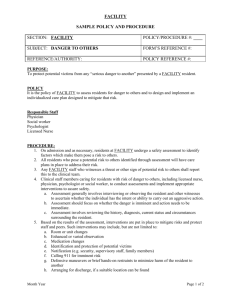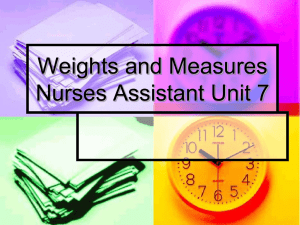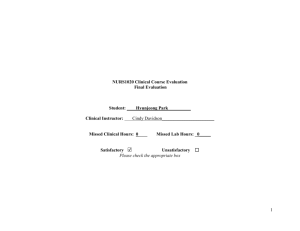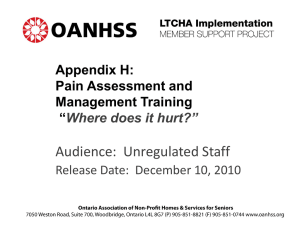File - Hyunjeong Park
advertisement
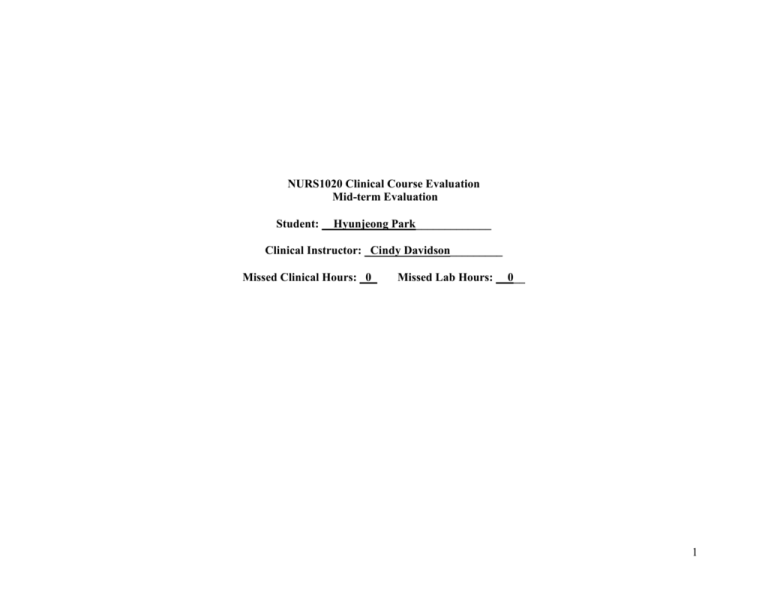
NURS1020 Clinical Course Evaluation Mid-term Evaluation Student: __Hyunjeong Park_____________ Clinical Instructor: _Cindy Davidson_________ Missed Clinical Hours: _0_ Missed Lab Hours: __0__ 1 NURS1020 Clinical Course Evaluation Program Goals Students graduating from this program are prepared as generalists entering a self-regulating profession in situations of health and illness. Students graduating from this program are prepared to work with people of all ages and genders (individuals, families, groups, communities and populations) in a variety of settings. Students graduating from this program are prepared to work with people of all ages and genders (individuals, families, groups, communities and populations) in a variety of settings. Graduates will learn to continuously use critical and scientific inquiry and other ways of knowing to develop and apply nursing knowledge in their practice. Students graduating from this program will be prepared to demonstrate leadership in professional nursing practice in diverse health care contexts. Graduates will be prepared to contribute to a culture of safety by demonstrating safety in their own practice, and by identifying, and mitigating risk for patients and other health care providers. Students will demonstrate the ability to establish and maintain therapeutic, caring and culturally safe relationships with clients and health care team members based upon relational boundaries and respect. Graduates of this program will be able to enact advocacy in their work based on the philosophy of social justice. Graduates will effectively utilize communications and informational technologies to improve client outcomes. Graduates will be prepared to provide nursing care that includes comprehensive, collaborative assessment, evidence-informed interventions and outcome measures. 2 Course Objective Established therapeutic nurse-resident relationships in residential long-term care settings. Performed skills relevant to situating an individual within his/her personal, familial and community context. Progress Evidence/Indicators: (The student has ...) - Learned to build rapport with residents by showing empathetical communication. Communicated with different residents of what procedures will be performed and introduced myself as a student nurse. - practiced effective communication skills such as eye contact, nodding, paraphrasing what their needs were, and did not interrupt resident when they were talking. - also kept my promises (ex. When a resident wanted to go to the bathroom, I told her I will tell a PSW and that I will be back. I returned to her right after I told a PSW to reassure her so that she wouldn’t wait indefinitely.) - Showed interest in resident’s artwork and stories. Helped residents with basic hygiene such as combing hair and placing oxygen tank near the resident. Aided residents to the dining table. Attended activity day with four residents to provide some social support by complimenting their achievements (ex. One resident served in the army and we complimented her and appreciated her work) and showed interest in their stories. - Developed and demonstrated skills in basic assessment techniques relevant to the long-term care population. Listened to lung sounds of one resident, listened to heart sounds and took one blood pressure measurement of one resident (for practice only), observed mobility of resident during transfers, observed awareness (cognitive assessment) of resident by talking with them. - assessed skin status during brief chaning and bathing. - assessed swallowing during feeding. Satisfactory Unsatisfactory Y ☐ Y ☐ Y ☐ 3 - Assisted staff for basic activities of daily living such as dressing, bathing, and feeding. - respected resident preferences (ex. Did not place jam on toast if they did not want it / during serving, went around tables because resident wanted us to practice table manners / always asking before I touch or take away their food / asked what clothes resident wanted to wear by giving them two choices) therefore it demonstrated client-centered care. - also, by asking for consent, I was able to respect their needs. Y ☐ - Learned both AM and PM routines. - I didn’t realize that some residents are “bored” – they felt lonely and wanted company. This was articulated during an activity day where we served tea and talked for two hours with four residents. - learned that some had “table manners” preference, and to respect their culture. - learned that most people are cognitively capable and that even residents with dementia are able to communicate well. Y ☐ - Only performed skills that I learned or was somewhat confident with—practicing within boundaries (what I learned in labs and courses) - ensured that I was supervised with lifts and practiced proper transfer technique - always got consent first or started only after I have told them what I would be helping with - demonstrated safe feeding by checking inside the Y ☐ Demonstrated skills in providing (resident) client-centered support for activities of daily living. Developed knowledge about the experience of residents living in a longterm care setting. Demonstrated safe and ethical clinical practice at the level appropriate for a year one nursing student. 4 Participated in professional development based on reflective practice and clinical inquiry. Examined personal attitudes regarding the elderly and other residents of long-term care homes. Developed a basic knowledge of the clinical manifestations and relevant nursing interventions of chronic diseases. mouth to make sure they were swallowing - kept confidentiality by not mentioning the resident’s names Asked questions to RPN, PSWs and clinical instructors when I was unsure, and researched information by looking up the resident’s charts. - reflective journal was done every week to talk about things that I’ve learned, and how I can improve practice. - Examples: I learned not to place confidential material outside of nursing desk to be more accountable / learned that I should reflect on my culture in order to bathe residents professionally and provide dignity with client-centered care. My stereotype of elderly was that people are somewhat mentally incapable to communicate well but I was wrong because I learned that even residents with dementia was capable of communicating their needs. Also, I learned that people who have physical incabilities are at LTC homes, not only people who have cognitive problems. Another stereotype I had was that older adults always prefers company, but I was wrong because people have different preferences and some want to be left alone. I gained some knowledge of clinical manifestations and relevant nursing interventions of chronic diseases by writing a weekly clinical care card and medical cards. Also, by researching resident’s charts, I was able to gather more knowledge of what types of diseases and medicines were needed. It was an eye-opener because I never realized older adults took so many various medications in a single day. Y ☐ Y ☐ Y ☐ 5 Clinical Instructor Comments (Any area marked “unsatisfactory” need to be commented on). Click here to enter text. Signature of Instructor__Click here to enter text.___________________ Date___Click here to enter a date. Signature of Student____Hyunjeong Park____ _______________ Date_13/02/2014 6




